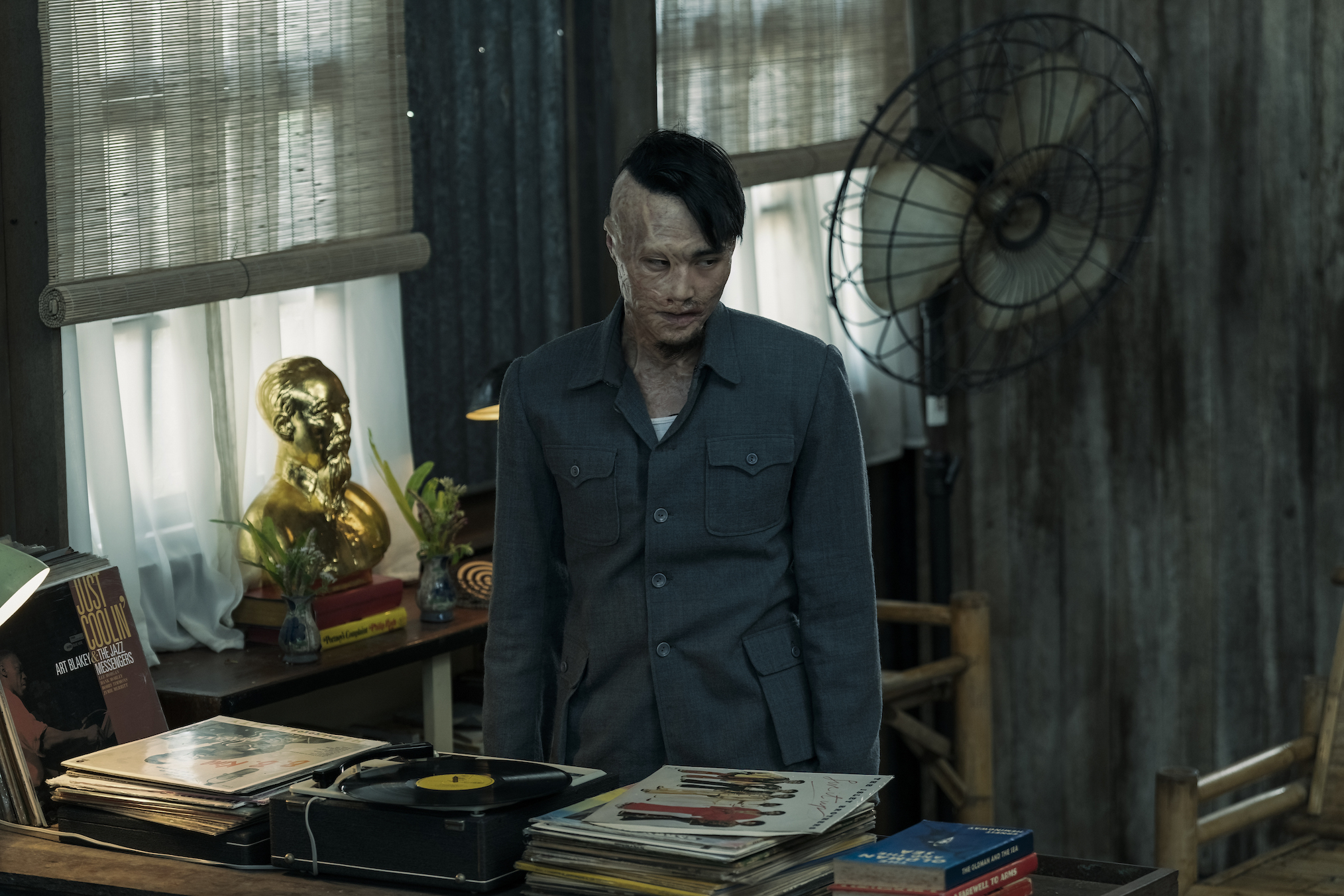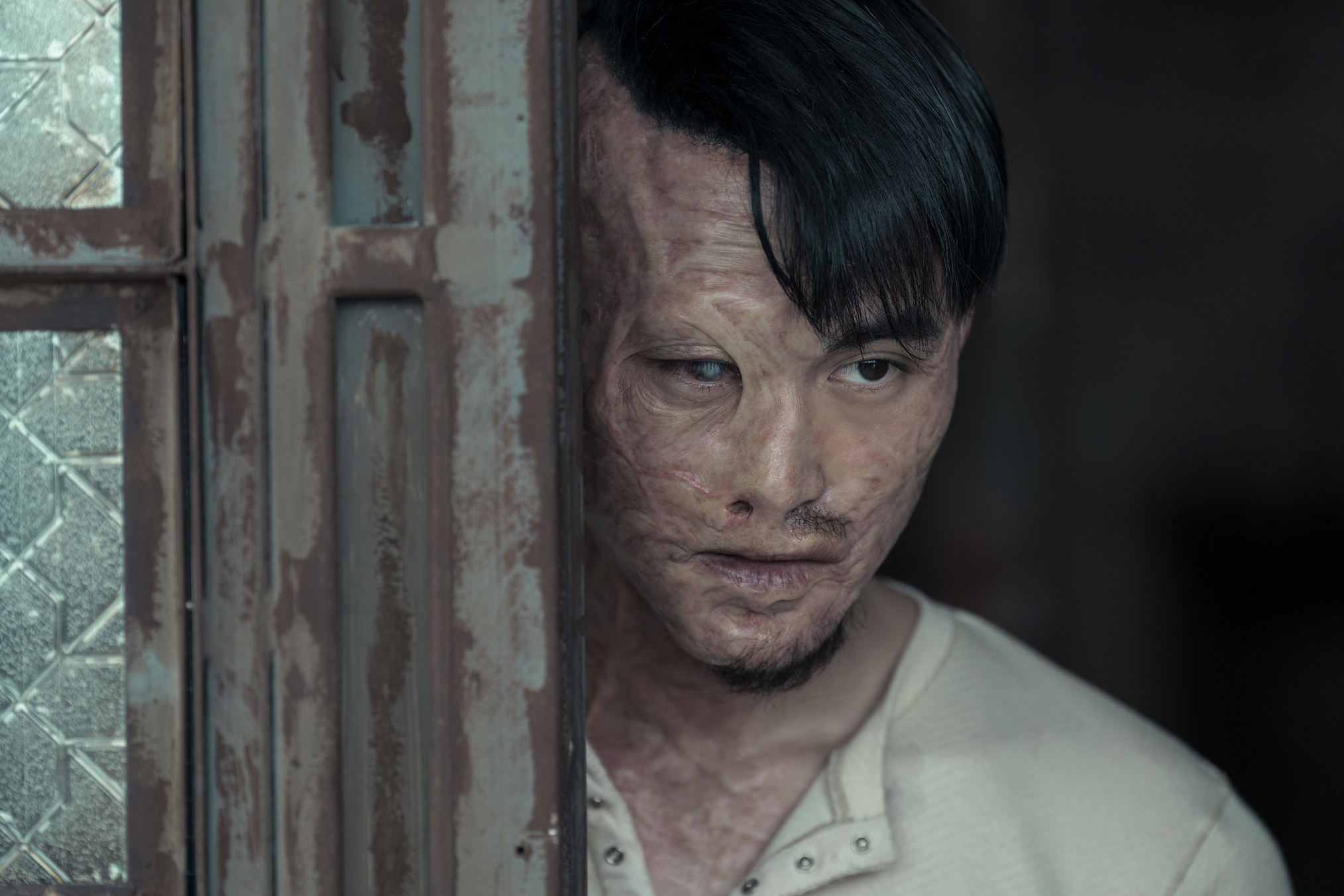[Warning: The following contains MAJOR spoilers for The Sympathizer finale.]
The Sympathizer has been slyly teasing the identity of the Commissar since Episode 1, and the finale at last revealed who he is. It also revealed a surprise fifth Robert Downey Jr. character that makes the entire story come full-circle.
For most of the season, viewers have been watching the Captain (Hoa Xuande) tell the story through stylistic flashbacks, using his love of American cinema and music to tell the story like a movie. There were occasional cuts to the present day where the Captain was imprisoned in a Vietnamese reeducation camp and being forced to make edit after edit to his confession “script” until the officers, and the unseen Commissar, were satisfied.
If you didn’t figure out the Commissar’s identity through the clues peppered throughout earlier episodes, the finale makes it abundantly clear that the Captain has had a hunch about this person’s identity all season long when he directly addresses the camp’s leader through song. He holds up his hand at the end of the song — which features lyrics referencing the Three Musketeers (the group name the Captain, Bon, and Man gave themselves as kids) — to show the scar on his hand that matches his blood brothers’. It’s then we learn for sure that the Captain believes the Commissar to be his best friend, Man (Duy Nguyen), whom he hasn’t seen since he and Bon escaped Vietnam during the fall of Saigon.
The Captain and Man are so happy to be reunited, but that doesn’t stop Man from ordering his best friend to be tortured. Nguyen tells TV Insider how Man was able to justify this.
“The pain makes him realize the value of the war,” Nguyen says. “What does it bring to the people? He freed the people. He sacrificed for the people, but now he can no longer go outside without a sack on [his head]. His image, everything is gone. And then the question is, was it worth it? That’s the question that he imposed on the Captain. And that’s why he wants the Captain to stay in America because that’s the only way he knows that his friend can really live freely. And then, the Captain defies orders and went back to Vietnam anyways and he gets captured.”
Bon (Fred Nguyen Khan) hasn’t lost his “fighting spirit” after being held prisoner for a year in the camp. He challenges the Commissar publicly, resulting in swift punishment, and the Captain panics and covertly reveals his theory about the Commissar’s identity. He was right. After being brought to the Commissar’s office, the officer removes his face covering to reveal his true self. It’s Man, but he’s been horribly disfigured after a napalm attack during the fall of Saigon, leaving him with severe burn scars all over his body and permanently damaging his vocal cords. He’s also gone a bit mad not just from the pain of the full-body injury, but from the emotional toll of the war.

Hopper Stone / HBO
“Torturing his friend, of course, he’s not enjoying that. But for Man, it’s the only way he can show the Captain how meaningless this war is,” Nguyen continues, saying that a line from The Sympathizer book perfectly defines Man and the Captain’s arcs. “There’s a line in the book that really explained his ideology when he said, ‘Nothing is more precious than independence and freedom. The only person who know what a joke that is, is the person with no face or a person with two minds.’”
Man is the faceless, jaded soldier whose reality is now defined by regret and dread. The Captain is the two-headed man who got so deep into playing both sides, he’s blind to the reality of just how bad things are despite the Northern Vietnamese victory. “Man and the Captain, their journeys [are] mirrored,” Nguyen says. Man can’t let the Captain leave the reeducation camp without him realizing the meaningless of the war.
Writer and executive producer Don McKellar further explains Man’s disillusionment to TV Insider, noting that it’s not just the physical pain he’s suffered that has driven him mad.
“[Man] thought he was keeping [the Captain] safe from the harsh reality of the camp, but of course, he’s also gone mad basically. So his judgment may not be that sound,” he says, adding, “There’s a sense that once he saw that his dream of this communist utopia was diluted, he couldn’t take it. And it is a lesson he wants the Captain to learn too. And in his mad mind, that means putting him through the same kind of torture that he went through. But still, in the end, the friendship survives. Their loyalty to each other survives.”
Vietnamese reeducation camps aren’t often taught in history classes, not even in Vietnam. Nguyen, who grew up in Hanoi, Vietnam, and moved to Ottowa, Canada 10 years ago, says he “was not exposed to this” history when he was young.
“I worked on The Sympathizer, and I asked my parents afterwards, I’m like, ‘Do you know about the reeducation camps?’ And my parents are like, ‘Oh, yeah, that exists,’” he shares. “But we never talked about it. It was never taught in school.”
Reading The Sympathizer novel in 2016 was the first time he ever heard of them. “I thought at first it was just a fictional thing. I didn’t know it was real,” Nguyen says. “And then working on the show, doing my research, watching old movies about the war made by the Southern [Vietnamese] filmmakers I realized, oh, sh*t. This whole part of history was kept away.”
His research included reading the diaries of people who survived the camps, which kept people captive for years without trial and subjected them to torture. “It was so profound” reading those first-hand experiences, Nguyen says. “That’s what Man feels as well during the episode when he has to torture his friend. He fought for freedom for his people, but now he’s in charge of taking away that freedom that he fought for. It affected him deeply, and it affected me deeply. That’s why it makes performance more personal.”
The addition of the prosthetic makeup depicting Man’s scars also helped inform Nguyen’s finale performance. Our interview is the first time Nguyen’s able to talk about this openly. “I’ve been keeping it a secret for so long,” he says. It took four hours for the prosthetics to be applied once the team got used to the process, “but at first it was five hours” every day, he shares. “It’s very intricate, and we were shooting in Thailand and it’s hot, it’s sweaty, so they had to make sure that the prosthetic would stay for 12 hours. It’s a lot of work.”

Hopper Stone / HBO
He also spent hours alone in his hotel room figuring out Man’s damaged voice. They didn’t have much rehearsal time, so Nguyen “would just lock myself in the hotel room and just try it out.”
“Coming to that voice, it’s like playing jigsaw puzzles,” he explains. “You don’t want to dehumanize him. You don’t want his voice to be so ugly that you can’t see him as a person anymore, but also it can’t be so normal. You still have to show the damage. At first I looked at the diseases and all the things that affect your vocal cords, but I just don’t feel comfortable imitating that. So I decided to figure it out in my own body what kind of damage he has, how much air can he take in, does the physical aspect of the injury influence how it speaks? But it also has to be sustainable because we were shooting 12 hours a day. So lots of trial and error.”
“It’s the most fulfilling things I’ve ever done in my life,” he notes. “As an actor, it’s a dream role to be able to transform yourself in that way. So I would do it again, no question.”
Man was horrified to see his two best friends in the world, his brothers, arrive at the camp. He thought he saved them from this fate by sending the double-agent Captain to America and making the Southern loyalist soldier Bon go with him. In real life, Khan and Nguyen have been best friends for years, and Nguyen and Xuande became very close while filming. It wasn’t hard to access his emotions seeing these good friends at the camp.
“For Man, it’s a profound disappointment. He thought he did his best to keep his friends away from this. But now they’re here,” he explains. “So in torturing Captain, there’s a bit of ‘I told you so.’ And keeping Bon in a box so that he won’t kill himself, that’s another level of pain that they have to go through.”
Man eventually lets the Captain and Bon escape the camp. Nguyen says he and Xuande debated a lot on set about why Man tortured the Captain at all. “Why didn’t he just let the Captain go? Well, if Man let the Captain go from the get-go, the Captain will come back. He will come back because he still thinks he’s the hero of the revolution. He still thinks that all the terrible things he did for the war are justified. So Man has to get the idea out of him.”
The Captain learns that the Commissar had read every single draft of his confession. Each time we see him working on the draft throughout the series, it’s possible that the Captain is trying to speak in written code to the Commissar to test his Man theory. Man sent the Captain orders in Los Angeles through coded letters, so it’s a solid way to test the theory.
“Because the Captain knows that the commissar is reading this, maybe there’s a level of him deliberately lying in his confession,” Nguyen says.
For Nguyen, the most meaningful part of The Sympathizer is the immovable love and commitment shared between the Captain, Man, and Bon despite their political differences.
“It’s a life and death situation for them to pick a side,” he says. “But somehow they still love each other. They still fight for each other.”
The Sympathizer, Available now, Max
